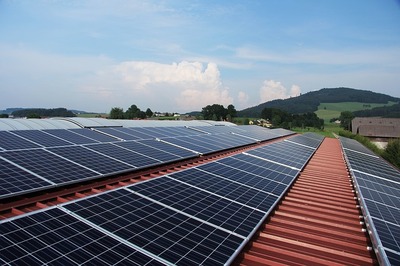Wisconsin Residents Wanting to Install Solar Panels Face More Hurdles Compared to Other States
Wednesday, March 29th, 2023 -- 8:00 AM

(By Joe Schulz, Wisconsin Public Radio) Wisconsin homeowners and small businesses interested in installing solar panels on their property face more hurdles than their counterparts in some other states, clean energy advocates say.
According to Joe Schulz with Wisconsin Public Radio, that's because state regulation makes it tough to lease solar panels, though leasing agreements are widely available in other places.
In Wisconsin, the primary mechanism for installing solar panels on a property is contracting through a private company to buy and install the panels, which often has an upfront cost of tens of thousands of dollars.
The federal Inflation Reduction Act offers a variety of tax credits for homeowners and small businesses, as well as other programs for nonprofits and local governments. But many of those incentives come on the back end of a solar project.
"The costs of solar have come down over the years, but it's still a significant upfront cost," said Andrew Kell, policy director for RENEW Wisconsin, a nonprofit that promotes renewable energy.
"And if you are a not-for-profit organization, small business with capital investment constraints, a low-income residential customer or a moderate-income customer, it's oftentimes hard to make that investment."
High upfront costs have largely limited solar to people who have the means to buy panels outright, according to Tom Content, executive director of the Citizens Utility Board of Wisconsin.
Those obstacles have been highlighted after developer Sun Badger Solar ceased operations earlier this year, leaving customers who spent tens of thousands of dollars in the dark about the status of incomplete solar projects.
One mechanism the Citizens Utility Board and RENEW Wisconsin say would help address the issue is called, "third-party financing." It essentially allows customers to lease panels on their property from an installer who owns the panels. At least 29 states allow third-party solar financing.
"In Wisconsin, technically it's allowed, but only on a case-by-case basis, and you have to go through a lot of hurdles to do it," Content said of third-party financing. "There have been some projects that have moved forward under leasing, but not very many."
Those looking to utilize third-party financing need to get individual projects approved by the Public Service Commission of Wisconsin, the state's utility regulator. Utilities have opposed third-party financing because they say it violates state law by allowing installers to act as a utility without being regulated as one.
Brendan Conway, a spokesperson for WEC Energy Group, the parent company of We Energies and Wisconsin Public Service, said his utility isn't opposed to rooftop solar itself.
He said We Energies interconnected more than 1,100 rooftop solar projects alone last year. But he said the utility is against third-party solar, and argued out-of-state companies would benefit from it.
Feel free to contact us with questions and/or comments.




